Recently, I saw a Tweet asking podcasters when was the last time that they recommended another episode of their podcast that listeners might enjoy based on the episode they were listening to. This specific activity isn’t something I do often with our podcast, since we’re working through different detective series and honestly, I can’t remember all the details of more than 3,800 episodes enough to be handing out 1:1 plot recommendations.
However, what did occur to me is that listeners who like the programs that we’re currently playing may enjoy another series from our archives that’s similar. I’ll be making specific recommendations for our current programs in podcast episodes next week. In this article, I’ll not only cover those series that we’re currently featuring, but those we’ve started, going back to Season Eleven. Note: I’m only going to do series that we did for a long time (apologies to so many of the short programs we’ve done).
Mondays:
If listeners enjoyed Dan Holiday’s adventures in Box 13, they might also like Night Beat. Box 13 is tough to find a match for and the characters’ motivation does differ. Dan Holiday needs to write novels and gets inspiration from the adventures that he’s sent on by people who mail Box 13, while Randy Stone spends his nights prowling around for a story that goes into the next edition of his newspaper, The Star. What both have in common is that not only do they each have a journalism background, but their methods lead to them investigating mysteries that you don’t really hear on other mystery programs.
Another tough program to match is Casey, Crime Photographer. No one’s going to match the exact quirkiness of Casey, Crime Photographer with the presence of unique characters like Ethelbert the bartender and the Blue Note (which is a character in and of itself), or Casey’s unique code of honor and role. However, if you want a similar style of mystery, you might enjoy Nick Carter, which was also produced in New York and has a similar style of crime fiction.
For people who love Spade, I’d suggest checking out Richard Diamond. This hard-boiled detective series starring Dick Powell, like Sam Spade, has plenty of humor, and like Spade it also has some romantic interludes. Diamond is a bit of a lady’s man and can spout a line of well-timed sarcasm. As a program, Richard Diamond has more violence than Sam Spade, and more and better singing.
Tuesday:
If you enjoyed the Australian version of It’s a Crime, Mr. Collins, you might also like The Adventures of the Abbotts, a 1955 NBC series whose scripts were later reused on It’s a Crime, Mr. Collins. The Abbotts generally features better quality acting and sound quality vs. It’s a Crime, Mr. Collins.
If you liked the serialized radio adventures of Dick Tracy, unfortunately, we don’t have a detective program quite like that. However, you may enjoy our Old Time Radio Superman podcast.
For lovers of the Australian version of The Fat Man, I’d recommend checking out Barrie Craig, Confidential Investigator. While not advertised based on weight, Barrie is established to be a big guy who gets into and out of lots of trouble.
If you were delighted by our extended revisit to Jeff Regan, I’d suggest listening to our dedicated Jeff Regan feed where you can find all the episodes we did of the series going back to our first season. Regan is another tough series to match very well: Regan’s status as an employee, his crazy uncle boss Anthony Lyons getting him involved in weird cases because of greed isn’t something you’ll find in other series. Richard Diamond may have the most in common as on this series, as some truly silly set-ups can lead to some genuine moments of hard-boiled action and peril.
Mister Chameleon was a a bit of an acquired taste for many people. If you enjoyed it, then you might also enjoy the other programs created by Anne and Frank Hummer, including Hearthstone of the Death Squad, Inspector Throne and the longest-running detective series of all-time, Mister Keen, Tracer of Lost Persons. We created a “Keen and Company” feed with all of those programs.
Several good matches for our current Tuesday series I Hate Crime are available. That Hammer Guy (the radio adventures of Mike Hammer), That Strong Guy (AU), and The Man From Homicide all feature more violent, rough-edged protagonists. They were among the series that some listeners complained about at the time, but if you like I Hate Crime, they may be worth checking out on my Hated Detectives feed.
Wednesdays:
Our last two Wednesday series, The Man Called X and Dangerous Assignment, featured stories of international troubleshooting and intrigue. If you enjoyed either of those series, you might want to check out The Adventures of Frank Race. In addition, we did another espionage-based series starring James Monks as I.A. Moto. The series is included with another James Monks-led series, The Avenger, in a combined podcast feed. In addition, even though it’s not in the detective genre, you might like Top Secret, starring Ilona Massey as a World War II/Cold War Secret Agent. We did the entire series for The Amazing World of Radio.
Thursdays
Our last two Thursday series, Mystery is My Hobby and Philo Vance, have some similarities to each other. Both feature genius detectives solving cases with the glowing admiration of minions of the law. Fans of Philo Vance might enjoy Boston Blackie, a series that was also produced by Ziv Productions, features an organ-based theme and also utilized New York character actors. Fans of both series might also enjoy more famous genius detectives like Sherlock Holmes, Nero Wolfe, and Hercule Poirot.
Fridays
Yours Truly Johnny Dollar is our Friday mainstay and each era is a little different in terms of what the show is most like.
With Edmond O’Brien as star, the series was one of the bleakest old time radio detective programs.The closest series to the tone and feel of O’Brien’s take on Johnny Dollar would be the Jack Webb episodes of Jeff Regan. If you’re into downbeat mysteries, you might also enjoy another short Webb-led series, Pete Kelly’s Blues, which is part of our Forgotten Detectives feed.
The John Lund version of Yours Truly Johnny Dollar was a big mix of different types of stories, including a lot of script reuse from series such as Richard Diamond. Overall the type of stories being featured were quite a bit different than the hard-boiled tales of the late 1940s and early 1950s. There are some very rich and multi-layered stories that reflect evolving listener tastes. Other programs from the mid-1940s, such as Barrie Craig, Confidential Investigator and The Abbotts, are most comparable.
Saturday
We’ve featured several Saturday procedural programs including The Silent Men and Tales of the Texas Rangers along with several shorter series. One program that procedural fans would do well to remember is our first Saturday series The Line Up, a series focused on realistic police cases, with each episode featuring a lineup scene. If you’ve enjoyed our other Saturday offerings, The Line Up is a must-listen.
If you have any recommendations or favorite golden age detective series that I’ve not discussed, feel to mention it in the comments.

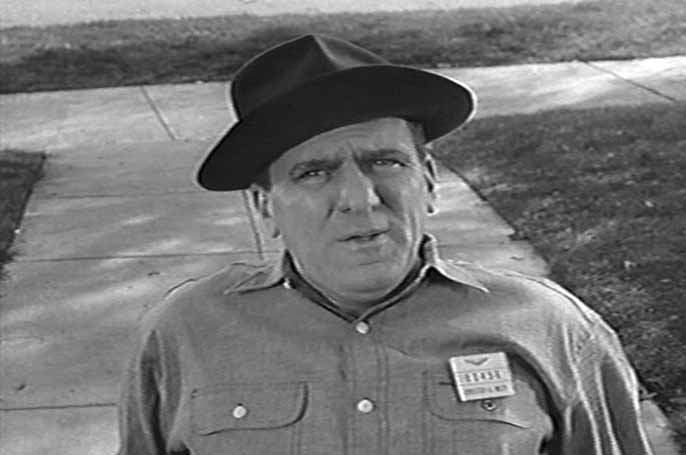
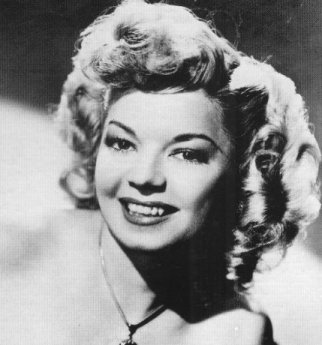 Frances Langford had a long association with radio that began in the mid-1930s and lasted for more than a decade and a half. She appeared on musical programs with Rudy Vallee and Dick Powell, but she was best known for her association with Bob Hope. During World War II, she toured with Hope overseas. She also played Blanche on the iconic radio sitcom, The Bickersons.
Frances Langford had a long association with radio that began in the mid-1930s and lasted for more than a decade and a half. She appeared on musical programs with Rudy Vallee and Dick Powell, but she was best known for her association with Bob Hope. During World War II, she toured with Hope overseas. She also played Blanche on the iconic radio sitcom, The Bickersons.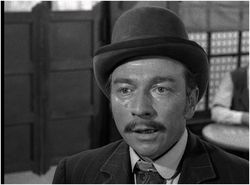 Vic Perrin’s first radio appearance was in 1943 for Free World Theater. He’d quickly become one of radio’s most vital character actors. He was a regular stock player for Jack Webb who was used constantly. He also appeared on programs such as Family Theater and Suspense. He continued to make radio appearances as the Golden Age headed to the twilight of its existence appearing regularly on Gunsmoke, Yours Truly Johnny Dollar, and Have Gun Will Travel. He also took on a rare recurring role as Sgt. Goerss on Fort Laramie. He also played a key role in Radio Revival attempts in the 1970s appearing on Rod Serling’s Zero Hour and the Sears Radio Theater. His voice work was also prominent in cartoons. He served a whole new generation of fans with his performance as Sinesto in the Super Friends, along with voicework for the 1978 Fantastic Four and 1983 Incredible Hulk animated programs
Vic Perrin’s first radio appearance was in 1943 for Free World Theater. He’d quickly become one of radio’s most vital character actors. He was a regular stock player for Jack Webb who was used constantly. He also appeared on programs such as Family Theater and Suspense. He continued to make radio appearances as the Golden Age headed to the twilight of its existence appearing regularly on Gunsmoke, Yours Truly Johnny Dollar, and Have Gun Will Travel. He also took on a rare recurring role as Sgt. Goerss on Fort Laramie. He also played a key role in Radio Revival attempts in the 1970s appearing on Rod Serling’s Zero Hour and the Sears Radio Theater. His voice work was also prominent in cartoons. He served a whole new generation of fans with his performance as Sinesto in the Super Friends, along with voicework for the 1978 Fantastic Four and 1983 Incredible Hulk animated programs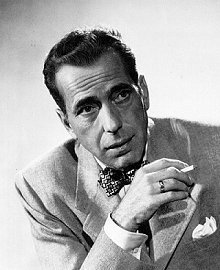 Bogart was first and foremost, a movie star.and one of the greatest of his or any other time. However, he showed time and time again that he was able to perform with the best of them on radio when his busy film schedule allowed. He adapted several of his movies to radio including The Maltese Falcon, Casablanca, The Treasure of the Sierra Madre, The African Queen, and To Have or Have Not as well as many of his Gangster roles such as Petrified Forest and Bullets or Ballots. These radio films are a rare treat for fans. Beyond these appearances, Bogart also starred in Bold Venture. Bold Venture was far from the best written radio drama with the oft-recurring plot of Bogart’s character Slade Shannon being played for a royal sucker by the underworld guest star of the week. That the show is so well-loved sixty years later is a testament to the sheer power of Bogart and Becall to overcome all odds, including those imposed by the writers.
Bogart was first and foremost, a movie star.and one of the greatest of his or any other time. However, he showed time and time again that he was able to perform with the best of them on radio when his busy film schedule allowed. He adapted several of his movies to radio including The Maltese Falcon, Casablanca, The Treasure of the Sierra Madre, The African Queen, and To Have or Have Not as well as many of his Gangster roles such as Petrified Forest and Bullets or Ballots. These radio films are a rare treat for fans. Beyond these appearances, Bogart also starred in Bold Venture. Bold Venture was far from the best written radio drama with the oft-recurring plot of Bogart’s character Slade Shannon being played for a royal sucker by the underworld guest star of the week. That the show is so well-loved sixty years later is a testament to the sheer power of Bogart and Becall to overcome all odds, including those imposed by the writers. 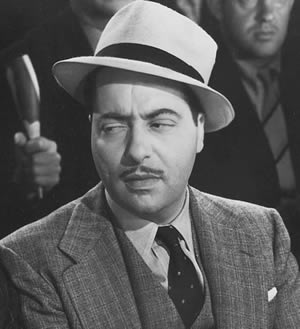 Harold Huber (1909-59): Star of screen, radio, stage, and television known best for his appearance in Charlie Chan films in the 1930s. He continued to play character roles until his death, appearing often on television. His last roles included appearances on the Phil Silvers Show and the syndicated series, Decoy.
Harold Huber (1909-59): Star of screen, radio, stage, and television known best for his appearance in Charlie Chan films in the 1930s. He continued to play character roles until his death, appearing often on television. His last roles included appearances on the Phil Silvers Show and the syndicated series, Decoy.